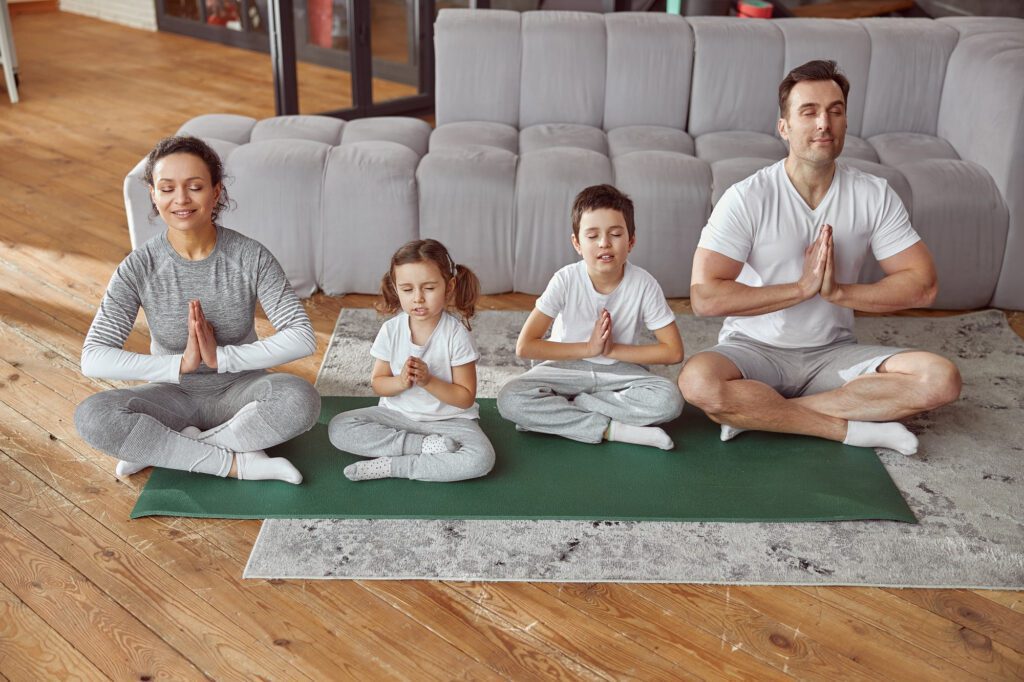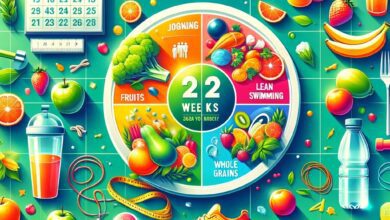Wellness Strategies for Holistic Family Health

1. Introduction
Families often get lost in the chaos and stress of modern life, which moves at a fast pace. Wellness for the family is more than just physical health; it includes mental, emotional, and spiritual health as well. Families can not only get through problems if they have the right plans, but they can also do well in spite of them. When you make these habits your own and use them, you set the stage for a happy, healthy, and peaceful family life.
2. Primary Wellness Practices for Family Health

2.1. Ancient Wellness Practices:
- Yoga: Yoga comes from ancient India. It is a combination of physical poses, breathing exercises, and meditative practises that work well together. When families do yoga together every weekend, it can help them become more flexible, improve their ability to focus, and bring them closer together.
- Ayurveda: Ayurveda is a science that has been used to heal people for more than 5,000 years. Ayurveda focuses on keeping people healthy and preventing illness. It does this by giving people individualised diet plans and using herbs for healing. Families might want to talk to Ayurvedic practitioners to learn about their body types and get advice on what to eat and how to live.
- Meditation: In our busy world, it can be very helpful to teach family members, especially children, how to meditate. Setting aside 15 minutes a day for meditation can help you think more clearly, feel less anxious, and become more aware.
2.2. Healthy Family Meals:
- Meal Planning: This is about more than just dinner. It’s important to know the nutritional needs of everyone in the family, from babies to grandparents, and to plan meals that meet those needs. By doing research and making a balanced weekly meal plan, you can make sure that your family gets a good mix of proteins, vitamins, carbs, and fats that are important to their health.
- Cooking Together: Make time in the kitchen a family event instead of a chore. It’s an opportunity for kids to learn about measuring, nutrition, and the art of cooking. Also, making meals together is a great way for family members to get to know each other better as they talk about their lives and share stories.
- Family Dinners: Family dinners are more than just a way to get food. They are an emotional centre. It’s a set time when everyone talks about their day, celebrates small wins, and helps each other out when things are hard. Eating together can help people feel like they belong and respect each other.
2.3 Mental Wellness:
- Open Dialogues: Emotional health is improved in a place where all feelings, like happiness, sadness, anxiety, and excitement, are recognised and talked about. This can be made possible by having regular family meetings where everyone, including children, can talk about their worries, thoughts, or experiences.
- Digital Detox: Setting aside a day or a few hours each week when you can’t use any digital devices can help you feel better. This can make it easier to play games, read books, do arts and crafts, or just have heart-to-heart talks.
- Nature Walks: Nature has more healing power than anything else. Taking a nature trip with your family once a week, whether it’s hiking, picnicking, or just walking, can give you a break from the concrete jungles and refresh your mind and body.
3. Balanced Lifestyle Strategy (drawdown) Performance

3.1 The Science Behind Balance:
- Time Management: Managing different parts of life takes skill, just like putting together a jigsaw puzzle. Using tools like family calendars, scheduling apps, or even just simple to-do lists can help you set aside time for work, chores, relaxing, and spending time with your family.
- Quality over Quantity: Spending three hours with family fully present and paying attention is much more valuable than staying in the same house for a whole day but being absorbed in your own digital world. Families should try to make memories that mean something, even if they are only together for a short time.
- Rest and Recovery: It’s important to know that it’s okay to take a break. Setting up mandatory times to relax, when everyone in the family can do what they want to do to unwind, can prevent burnout and improve health as a whole.
3.2 Holistic Approach:
- Hobbies: Hobbies aren’t just fun things to do; they’re also good for the soul. Encourage everyone in the family to take up a hobby, whether it’s gardening, painting, music, or dance. This gives everyone a way to express themselves and their passions.
- Relaxation Techniques: There will always be stress. But the way it is run will decide how it affects health. Teaching deep breathing exercises, progressive muscle relaxation, or guided imagery to family members can give them tools to deal with the stresses of daily life.
- Building Connections: Emotional bonds don’t appear out of thin air. Family ties can be strengthened by doing things together like telling stories, playing games, or just cuddling up for a movie marathon.
3.3 Results:
- Monitoring Progress: Keeping a wellness diary can make a big difference. Here, families can write down what they do, how they feel, what problems they face, and what they do well. Over time, this can be used to help you think about what needs to be fixed and what changes have made a positive difference.
- Celebrating Milestones: Did the family manage to go a whole weekend without using any tech? Or did everyone keep up with their weekly workouts? Even small steps like these should be celebrated. It could be something as simple as a homemade dessert or a fun trip with the whole family.
- Feedback Mechanism: Only change stays the same. Holding monthly review meetings where the family talks about the wellness plans, how well they’re working, and what changes might be needed can make sure that the plans are still relevant and useful.
3. Wellness Mindset for Parents: Expert Tips

3.1 Self-Care is Paramount:
- Routine: Self-care is more likely to be done if it is part of daily routines. It could be a jog in the morning, a skin care routine at night, or even just 10 minutes of meditation in the morning.
- Alone Time: Parents often forget how much they enjoy being alone because they are so busy with their families. It can be very helpful to give each parent personal time when they can do things they enjoy or just rest.
- Seeking Help: Parenting is fun and rewarding, but it can also be hard. If the primary caregivers know how to spot signs of fatigue, stress, or anxiety and get professional help right away, like counselling sessions or therapeutic workshops, they can stay healthy.
3.2 Lifelong Learning:
- Staying Updated: The worlds of parenting and wellness are always changing. Parents can stay up to date on the latest research, trends, and recommendations by subscribing to relevant magazines, journals, or digital platforms.
- Workshops: A lot of places and groups offer workshops on parenting, child psychology, wellness, and other topics. Parents can learn a lot from these events, and they can also meet other parents and experts and make connections with them.
- Online Resources: There is a wealth of information in the digital world. Exploring parenting and health-related websites, webinars, online courses, and forums can give you ideas, tips, and direction.
3.3. Community Involvement:
- Local Groups: Many towns and cities have groups for parents or for health and wellness. By joining, you can talk about your experiences, talk about problems, and learn from your peers.
- Events and Workshops: Families can learn about new health products, tips, and local experts by going to community events, fairs, or workshops.
- Support Systems: Building a network of support is very important. Having understanding friends, family, and mentors can make the journey to wellness easier and more enjoyable.
4. Conclusion
A holistic approach to family wellness transcends mere strategy—it embodies a way of life. While this journey demands a blend of dedication, mindfulness, and sometimes a paradigm shift, the benefits it yields are profound and enduring. A family grounded in holistic wellness fosters resilience, emotional savvy, and forms an unbreakable bond capable of weathering any storm.
Understanding the Inevitable Challenges: In our exploration of wellness techniques, it’s paramount to note that obstacles are inherent milestones on this path. From the inertia against change, the ever-pressing demands of time, external societal pressures, to occasional deviations from the plan, challenges are myriad. But in every challenge lies an opportunity—a lesson. Embracing these lessons fortifies a family’s wellness resolve.
Personalizing the Wellness Blueprint: Families are as diverse as fingerprints. And while our discussion furnishes a robust wellness blueprint, tailoring these strategies to resonate with a family’s unique rhythm is vital. It’s not a one-size-fits-all; it’s about continuously refining approaches based on familial feedback and experiences.
Tapping into External Wisdom: Families, though a strong fortress of support, might sometimes need external reinforcements. This can manifest as counselors, dieticians, community groups, or therapists. These external pillars offer new vantage points, niche expertise, and unbiased counsel, enriching the wellness narrative.
Cultivating a Wellness Ethos: Beyond mere strategy adoption, it’s about weaving a culture of wellness into the familial fabric. It’s envisioning a milieu where every decision, every action, and every conversation is colored with the essence of well-being. Where wellness is not a task, but a lifestyle.
A Continuing Odyssey: The pursuit of family health is a perpetual voyage, abundant with revelations, joy, trials, and growth. It seeks patience, dedication, empathy, and a heart full of love. But its gifts—a cohesive, joyful, and thriving family life—are beyond valuation.
Community Dialogues: Our roadmap is drawn, and the insights shared. The baton now passes to you. How does wellness manifest in your family tapestry? Your tales, your strategies, your tribulations, and triumphs can light the way for many. By sharing, we create a mosaic of wellness wisdom. Together, let’s journey towards building families robust in body, mind, and soul.
5. FAQs ( Frequently Asked Questions)
Q1: Why is a balanced lifestyle crucial for families?
A: A balanced lifestyle is the pivot point on which the health of a family turns. Making sure that families get the right amount of work, downtime, and quality time together is about more than just making sure that they get along. It teaches young minds the value of balance, keeps people from feeling burned out or overwhelmed, and helps family members feel closer to each other. In the end, a balanced lifestyle is the best way for families to deal with the many problems they face today.
Q2: How can ancient wellness practices be integrated into modern life?
A: In a time when fast technological progress is praised, the wisdom of our ancestors can sometimes be forgotten. But what’s great about ancient ways of staying healthy is that they still work today. It’s easier than you might think to bring them into the busy world of today. For instance:
- Morning Rituals: Starting the day with a few minutes of meditation, deep breathing exercises, or yoga can set a calm tone for the rest of the day.
- Herbal Remedies: Instead of always taking over-the-counter medicines, it can be helpful and educational to try herbal remedies for minor illnesses.
- Mindful Eating: Ayurveda teaches that being present during meals and understanding the meaning of what we eat can change the way we feel about food.
Q3: How does community involvement enhance family wellness?
A: People have always been social by nature. Families get more out of being part of a community or support group than just a place to meet new people. Getting involved in communities can:
- Shared Wisdom: Every family has its own experiences, and telling others about them can give them new ideas or ways to do things.
- A Sense of Belonging: Especially when things are hard, it can be very comforting to know that there is a community that understands and supports you.
- Opportunities for Growth: Families can learn about new ways to stay healthy through community events, workshops, or even just interesting conversations.
Q4: What’s the significance of self-care for parents in family wellness?
A: In order to take care of their family, parents often put their own health and happiness last. But the old saying “You can’t pour from an empty cup” is still true. Self-care for parents is essential to the health of their children because:
- Modeling Behavior: Children learn from what adults do. When their main caretakers put their health and safety first, they understand how important it is.
- Emotional Well-being: When a parent is rested and calm, they can treat their kids with more love, patience, and understanding.
- Physical Health: Making sure they are healthy lets parents take part in family activities, whether it’s a simple game of catch or a trip to the mountains.
Q5: Are there any specific tools or resources to help parents in their continuous learning journey?
A: Absolutely! It’s important to keep learning, especially since family, children’s needs, and societal changes are always changing. Some resources that parents can use are:
- Online Platforms: There are a lot of articles, expert opinions, and community discussions on sites like Parenting.com, Today’s Parent, and others.
- Webinars & Workshops: Experts often hold talks about specific problems that parents face, like how to deal with angsty teens or how the digital world affects kids.
- Books: There are a lot of books about parenting, and each one has its own ideas and strategies.
- Support Groups: Joining a local or online group for parents can be a great way to get advice and make friends.





